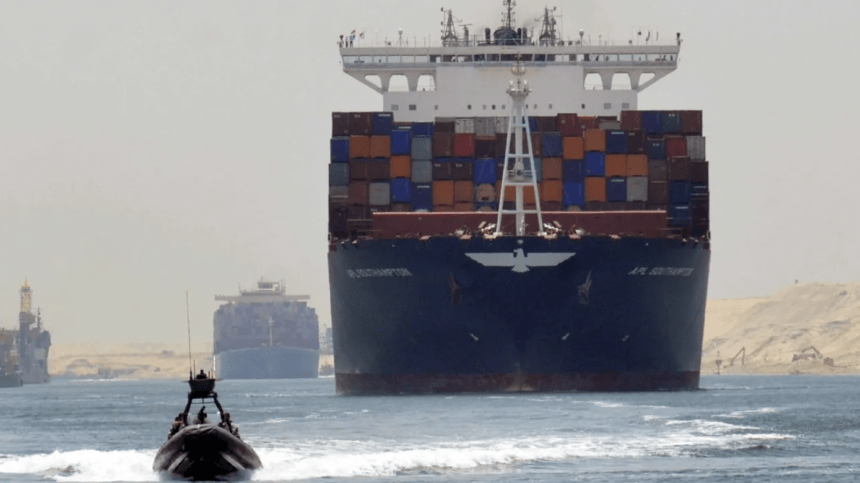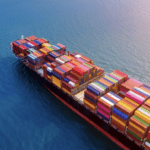Increasing attacks on merchant ships in the Red Sea raise concerns about Turkey’s import transportation of supplies, intermediate products and raw materials.
The attacks first hit the chemical and automotive sub-industry sectors. Industrialists, whose intermediate product and raw material deliveries were postponed until the end of January, are worried that production will be disrupted.
On the other hand, sectors such as ready-to-wear clothing, where business is going badly, do not expect a big problem in the short term as they were caught in the crisis with stocks. Sector officials evaluated the latest developments in the supply chain to EKONOMİ daily newspaper.
In the Red Sea, Iran-backed Houthis have been attacking ships passing through the Suez Canal since early December in connection with the Israel-Hamas war. Although the target is ships bound for Israel, this situation poses a risk for all ships using the canal. Most of the ships passing through Suez carry export cargo from the Far East, especially China, to Europe. Ships coming from the Far East to Turkey also pass through the Red Sea. However, due to the attacks in the region, many companies extended their routes by about 40 percent and started to go around the Cape of Good Hope. The lengthening of routes is also pushing container transportation freight rates up rapidly.
Danish container operator Maersk announced that it was preparing to allow its ships to use the Red Sea route after the US-led multinational security initiative became operational in the Red Sea, but that it would not hesitate to once again put in place diversion plans if deemed necessary. Some other shipping giants such as MSC are said not to return to Suez until security is fully restored in the region.
“ADDITIONAL COST BURDEN MAY FALL ON EXPORTERS”
Adil Pelister, President of Istanbul Chemicals and Chemical Products Exporters’ Association (İKMİB), stated that the chaos in the Red Sea has started to affect the sector and said, “According to the information conveyed by our company representatives, the delivery of the products planned to arrive this month has been postponed to the end of January. This delay in the supply of intermediate goods and raw materials that our industry needs may cause delays in production and export shipments. These delays may again lead to a shortage of containers.” Stating that while deliveries are delayed on the one hand, on the other hand, the freight has already increased 3-4 times for products purchased from Far Eastern countries, Adil Pelister said, “This increase in freight costs may adversely affect our companies on a foreign currency basis, especially since our exporters cannot make price changes in contract sales, the cost burden may fall on our exporters.”
AUTOMOTIVE SUPPLIERS TURNS TO AIR CARGO
Another sector with good international sales this year, automotive, has also started to face supply problems. Although the main industry has not yet been affected by the Red Sea crisis, bad news came from the supplier industry. Albert Saydam, President of the Automotive Suppliers Association of Turkey (TAYSAD), said the following on the subject: “First, our costs increased. Now delivery times have been extended. This situation may lead to a disruption in production. In order to avoid this, many companies have turned to air transportation without thinking about the cost. However, it is not possible to do this continuously.”
“China may step in for military support”
Başaran Bayrak, Deputy Chairman of the Turkish Exporters Assembly (TIM), stated that freight rates have been on the rise due to the prolongation of routes and that it has started to create disruptions in the supply chain. Bayrak stated that they foresee the problem to be solved in the short term and said, “However, Cape of Good Hope, which is an alternative to Suez, is a route that requires a lot of time and money. Therefore, I think that measures will be taken very quickly to open this route. Even China may resort to military measures, as the closure of the Suez Canal will have a negative impact on China’s trade. Moreover, the US has dispatched military ships to the region and declared that it had shot down about 12 unidentified drones.”
Freight increases rapidly
Developments started to be reflected in freight indices. Drewry’s World Container Index, which has witnessed rapid declines since the beginning of the year and partially moved upwards in early December due to seasonal effects, increased by 9 percent to $1,661 per 40ft container in the weekly period starting on December 21. In terms of routes, the highest increase was seen on the Shanghai to Rotterdam route. Freight rates on this route increased by 16 percent to $1,667 per 40ft container, while freight rates from Shanghai to Genoa rose by 15 percent to $1,956 per 40ft container. Drewry expects East-West spot rates to increase in the coming weeks due to the Red Sea/Suez situation.
“Shipowners are opportunistic”
Some sector representatives claim that shipowners are opportunizing in freight by using the situation in the Red Sea as an excuse. Yavuz Eroğlu, Chairman of the TOBB Plastic, Rubber and Composite Industry Assembly, who is one of the names supporting this view, said, “The number of ships changing course constitutes 2 percent of the total number of ships passing through Suez. So we think there is speculation again.” TOBB Ready-to-Wear and Apparel Sector Assembly President Şeref Fayat also said, “Unfortunately, I regret to observe that companies, whose transportation prices have fallen significantly after the pandemic and economic recession, have increased the freight to the point of opportunism by using the attacks as an excuse.”
“If it lasts longer, it can also be an opportunity for Turkey”
Local industrialists say that if the crisis in the Red Sea lasts for a long time, it could also create an opportunity for Turkey’s exports. It is stated that these developments and the additional cost burden that will be experienced in the supply from Asia to Europe may shift the supply of some products to Turkey, as was the case during the pandemic. This could increase Turkey’s exports to Europe.










